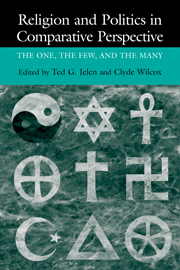Book contents
- Frontmatter
- Contents
- List of Contributors
- Preface
- 1 Religion: The One, the Few, and the Many
- 2 The Challenge of Pluralism
- 3 Catholicism, Politics, and Culture in the Republic of Ireland
- 4 Religion and Politics in Iberia
- 5 The Religious Dimension of Israeli Political Life
- 6 Between Heaven and Earth
- 7 Islamism in Contemporary Arab Politics
- 8 Religion and Politics in a Secular Europe
- 9 Religion and Democracy in South America
- 10 Looking for Hope in Central America
- 11 Religion and Politics in India
- 12 Religion and Politics in Japan
- 13 Religion and Politics in an Open Market
- 14 The Political Roles of Religion
- Index
13 - Religion and Politics in an Open Market
Religious Mobilization in the United States
Published online by Cambridge University Press: 05 June 2012
- Frontmatter
- Contents
- List of Contributors
- Preface
- 1 Religion: The One, the Few, and the Many
- 2 The Challenge of Pluralism
- 3 Catholicism, Politics, and Culture in the Republic of Ireland
- 4 Religion and Politics in Iberia
- 5 The Religious Dimension of Israeli Political Life
- 6 Between Heaven and Earth
- 7 Islamism in Contemporary Arab Politics
- 8 Religion and Politics in a Secular Europe
- 9 Religion and Democracy in South America
- 10 Looking for Hope in Central America
- 11 Religion and Politics in India
- 12 Religion and Politics in Japan
- 13 Religion and Politics in an Open Market
- 14 The Political Roles of Religion
- Index
Summary
The role of religion in American politics contradicts many conventional understandings. In an era when the citizens of Christian-majority nations are becoming increasingly secular, Americans remain remarkably devout. In a world in which many nations have established religious monopolies and others experience significant strife between religious groups, religious life in the United States is remarkably diverse, and the quiet competition between religious groups for adherents and voice in public life is generally intense but is also peaceful and even friendly. In a country best known for the “separation of church and state,” religion insinuates itself into politics and government in myriad, complex ways.
The unique character of American political institutions and culture often leads students of comparative politics to ignore the United States, or to treat it as a exceptional case with little to contribute to larger efforts at theory building. This might seem especially true in the area of religion and politics, for in many ways the United States is unique. Yet the U.S. case may have important implications for the comparative study of religion and politics. The ever-growing religious diversity in the United States may have implications for other nations, where longstanding religious monopolies face new competition. Moreover, it may well be that the devotion and diversity of American religion are related, and if so this may suggest that the U.S. case can help us refine our theories of societal religiosity.
- Type
- Chapter
- Information
- Religion and Politics in Comparative PerspectiveThe One, The Few, and The Many, pp. 287 - 313Publisher: Cambridge University PressPrint publication year: 2002
- 1
- Cited by



